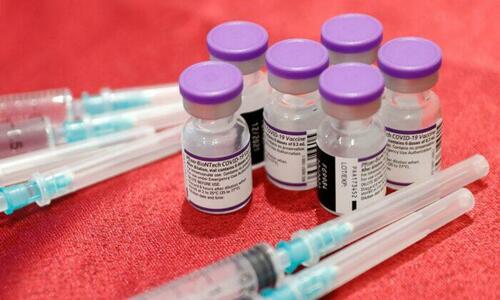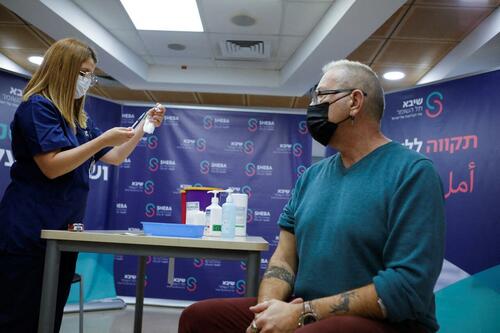
Authored by Meiling Lee and Zachary Stieber via The Epoch Times (emphasis ours),

Israeli researchers found some side effects that occurred after COVID-19 vaccination were caused by Pfizer’s vaccine, according to a leaked video.
The Israeli Ministry of Health (MoH) commissioned researchers to analyze adverse event reports submitted by Israelis and the researchers presented findings from the new surveillance system in an internal June 2022 meeting, video of which was obtained by an Israeli journalist.
Researchers said that the phenomenon of rechallenge—when adverse events reoccur or worsen following additional vaccine doses—proved that some of the events were caused by the vaccine.
A positive rechallenge was reported in 10 percent of the women who complained of menstrual issues, according to the researchers, who also identified cases of rechallenge for other adverse events.
Rechallenge changes a causal link “from possible to definitive,” Dr. Mati Berkovitch, head of the research team and a pediatric specialist, said at the meeting.
Rechallenge “helps us to establish the causal relationship,” added Sasha Zhurat, the main presenter at the meeting. The advantage of the surveillance system and the analysis “is not only to identify the symptoms but also to link them to the vaccine,” she said.

Footage of the meeting was leaked to Yaffa Shir-Raz, a health journalist and a risk communication researcher. Shir-Raz has publicly released clips from the meeting. The Epoch Times reviewed footage of the entire meeting and had key portions translated independently for this story.
About two months after the meeting, the MoH published a public report on the results of the data analysis. Language in the report on causality differed from that used during the meeting.
“The report presents all the cases that were reported in close proximity to the receipt of the coronavirus vaccine, and does not necessarily indicate a causal relationship between receiving the vaccine and the reported phenomenon,” MoH said in the report.
MoH spokespersons did not return or declined to answer questions on the discrepancy. Instead, a spokesperson sent a press release dated Sept. 19, 2021, that announced the “establishment of a dedicated information headquarters for the fight against the coronavirus.”
Zhurat declined to comment.
“I’m no longer part of the project. Unfortunately, I cannot address your questions. Please reffer [sic] your queries to the MOH,” she told The Epoch Times via Facebook message.
A request for comment to Dr. Emilia Anis, director of the MoH Division of Epidemiology and a meeting attendee, was returned by the MoH, which declined to answer the questions asked of Anis.
Berkowitz did not respond to a request for comment.
Rechallenge
Rechallenge in pharmacovigilance is one of the factors to determine causality and refers to the re-administration of the same vaccine or drug after an adverse event goes away to examine whether the same event occurs again.
Dr. Robert Malone, who helped develop the messenger RNA (mRNA) technology on which Pfizer’s vaccine is built, told The Epoch Times that rechallenge is a “standard pharmaceutical clinical trial practice” that can provide definitive proof of causality.
“The reports of rechallenge in the Israeli study do not prove causality,” according to Malone. Only a formal rechallenge trial would, he said. The analysis, though, “strongly suggests and supports causality,” he said.
Dr. Harvey Risch, a professor emeritus of epidemiology at the Yale School of Public Health, told The Epoch Times via email that the researchers “are essentially correct” in their conclusions that the vaccines caused the adverse events.
Researchers in other countries have said before that there are causal links between certain vaccines and certain side effects.
“The current evidence supports a causal association between mRNA COVID-19 vaccination and myocarditis and pericarditis,” Dr. Tom Shimabukuro, a health researcher with the U.S. Centers for Disease Control and Prevention (CDC), said during a meeting over the summer.
Moderna’s COVID-19 vaccine also utilizes mRNA technology. Myocarditis and pericarditis are two forms of heart inflammation that can lead to death.
Most side effects following COVID-19 vaccination tend to be mild and typically last only a few days, according to the CDC. Other post-vaccination conditions are described as adverse events.
Side effects are health issues that have been proven to be caused by a vaccine, while an adverse event is a medical condition that may or may not be related to the vaccine.
The CDC’s Immunization Safety Office declined to comment on the Israeli findings. “CDC continues to monitor the safety of COVID-19 vaccines and makes information available to the public in a timely and transparent manner,” it told The Epoch Times via email.
Pfizer and Moderna have not responded to requests for comment.
Israel has primarily administered Pfizer’s vaccine, entering into a unique agreement (pdf) with the U.S.-based pharmaceutical company. Israel quickly received Pfizer doses. In return, the country allowed Pfizer executives to access some national health data.

Other Findings Not Made Public
Israel’s surveillance system was revamped in December 2021.
The data presented in June was collected from December 2021 to May.
The surveillance system received a total of 8,000 reports, of which 1,741 were removed for providing incomplete or duplicate information.
Of the 6,259 reports presented, 599 were for children aged 5 to 11; 299 for adolescents aged 12 to 17; and 5,411 for adults 18 and older. More women than men completed the questionnaire.
A total of 29 categories of adverse events were identified, 22 of them from the blank space option on the questionnaire. However, only data for the first five categories with the most reports were analyzed: neurological (395 reports), general side effects (295), menstrual disorder (282), musculoskeletal disorders (279), and the digestive, kidney, and urinary system (192).
Many of the reported adverse events were found to be long-lasting, which researchers said in the meeting was surprising since the brochure handed to vaccine recipients says otherwise. They also said Pfizer officials told them that Pfizer did not know of any long-lasting symptoms.
Researchers also said that they identified new adverse events not listed in the brochure, including back pain.
In the official report later issued to the public, the MoH did not detail how researchers were caught off guard by the duration of the events and side effects. The health agency also stated that there were no new events identified.
“In conclusion, the reported phenomena are known phenomena in the professional literature and were also found in the previous reports of the Ministry of Health, and there was no observation of an increase in a new phenomenon (new signal),” the MoH wrote.
Shir-Raz, the journalist who broke the story about the internal meeting, said the delay in reporting the results included not sharing the data with the MoH expert panel that convened near the end of June to decide whether to recommend Pfizer’s vaccine for children aged 6 months to 5 years.
“We have the protocol of this meeting, so we know it specifies which documents were presented to them when they made their decision, and there was no mention of this study in the protocol,” Shir-Raz told The Epoch Times, citing a MoH document (pdf) she obtained. “So they hid it even from their own experts.”
Shir-Raz who was fired from her job last year for writing articles critical of the MoH’s handling of the lockdown and COVID-19 deaths statistics, said that breaking the story was about “getting the truth out.”
“For the past two months, I’ve been dedicating myself almost entirely to this story only … It’s not just another issue for me, it’s not another article,” Shir-Raz said. “For me, it’s getting the truth out. Because it’s not just local … It has international implications.”
US Connection
Israel has often been the first country to report on vaccine safety and effectiveness. Its data has regularly been cited by U.S. agencies, including the CDC.
Dr. Sharon Alroy-Preis, an Israeli official who has said she’s in charge of vaccine safety monitoring, has presented data four times to the CDC and the U.S. Food and Drug Administration since September 2021, most recently in April 2022.
Read more here...
Authored by Meiling Lee and Zachary Stieber via The Epoch Times (emphasis ours),

Israeli researchers found some side effects that occurred after COVID-19 vaccination were caused by Pfizer’s vaccine, according to a leaked video.
The Israeli Ministry of Health (MoH) commissioned researchers to analyze adverse event reports submitted by Israelis and the researchers presented findings from the new surveillance system in an internal June 2022 meeting, video of which was obtained by an Israeli journalist.
Researchers said that the phenomenon of rechallenge—when adverse events reoccur or worsen following additional vaccine doses—proved that some of the events were caused by the vaccine.
A positive rechallenge was reported in 10 percent of the women who complained of menstrual issues, according to the researchers, who also identified cases of rechallenge for other adverse events.
Rechallenge changes a causal link “from possible to definitive,” Dr. Mati Berkovitch, head of the research team and a pediatric specialist, said at the meeting.
Rechallenge “helps us to establish the causal relationship,” added Sasha Zhurat, the main presenter at the meeting. The advantage of the surveillance system and the analysis “is not only to identify the symptoms but also to link them to the vaccine,” she said.

Footage of the meeting was leaked to Yaffa Shir-Raz, a health journalist and a risk communication researcher. Shir-Raz has publicly released clips from the meeting. The Epoch Times reviewed footage of the entire meeting and had key portions translated independently for this story.
About two months after the meeting, the MoH published a public report on the results of the data analysis. Language in the report on causality differed from that used during the meeting.
“The report presents all the cases that were reported in close proximity to the receipt of the coronavirus vaccine, and does not necessarily indicate a causal relationship between receiving the vaccine and the reported phenomenon,” MoH said in the report.
MoH spokespersons did not return or declined to answer questions on the discrepancy. Instead, a spokesperson sent a press release dated Sept. 19, 2021, that announced the “establishment of a dedicated information headquarters for the fight against the coronavirus.”
Zhurat declined to comment.
“I’m no longer part of the project. Unfortunately, I cannot address your questions. Please reffer [sic] your queries to the MOH,” she told The Epoch Times via Facebook message.
A request for comment to Dr. Emilia Anis, director of the MoH Division of Epidemiology and a meeting attendee, was returned by the MoH, which declined to answer the questions asked of Anis.
Berkowitz did not respond to a request for comment.
Rechallenge
Rechallenge in pharmacovigilance is one of the factors to determine causality and refers to the re-administration of the same vaccine or drug after an adverse event goes away to examine whether the same event occurs again.
Dr. Robert Malone, who helped develop the messenger RNA (mRNA) technology on which Pfizer’s vaccine is built, told The Epoch Times that rechallenge is a “standard pharmaceutical clinical trial practice” that can provide definitive proof of causality.
“The reports of rechallenge in the Israeli study do not prove causality,” according to Malone. Only a formal rechallenge trial would, he said. The analysis, though, “strongly suggests and supports causality,” he said.
Dr. Harvey Risch, a professor emeritus of epidemiology at the Yale School of Public Health, told The Epoch Times via email that the researchers “are essentially correct” in their conclusions that the vaccines caused the adverse events.
Researchers in other countries have said before that there are causal links between certain vaccines and certain side effects.
“The current evidence supports a causal association between mRNA COVID-19 vaccination and myocarditis and pericarditis,” Dr. Tom Shimabukuro, a health researcher with the U.S. Centers for Disease Control and Prevention (CDC), said during a meeting over the summer.
Moderna’s COVID-19 vaccine also utilizes mRNA technology. Myocarditis and pericarditis are two forms of heart inflammation that can lead to death.
Most side effects following COVID-19 vaccination tend to be mild and typically last only a few days, according to the CDC. Other post-vaccination conditions are described as adverse events.
Side effects are health issues that have been proven to be caused by a vaccine, while an adverse event is a medical condition that may or may not be related to the vaccine.
The CDC’s Immunization Safety Office declined to comment on the Israeli findings. “CDC continues to monitor the safety of COVID-19 vaccines and makes information available to the public in a timely and transparent manner,” it told The Epoch Times via email.
Pfizer and Moderna have not responded to requests for comment.
Israel has primarily administered Pfizer’s vaccine, entering into a unique agreement (pdf) with the U.S.-based pharmaceutical company. Israel quickly received Pfizer doses. In return, the country allowed Pfizer executives to access some national health data.

Other Findings Not Made Public
Israel’s surveillance system was revamped in December 2021.
The data presented in June was collected from December 2021 to May.
The surveillance system received a total of 8,000 reports, of which 1,741 were removed for providing incomplete or duplicate information.
Of the 6,259 reports presented, 599 were for children aged 5 to 11; 299 for adolescents aged 12 to 17; and 5,411 for adults 18 and older. More women than men completed the questionnaire.
A total of 29 categories of adverse events were identified, 22 of them from the blank space option on the questionnaire. However, only data for the first five categories with the most reports were analyzed: neurological (395 reports), general side effects (295), menstrual disorder (282), musculoskeletal disorders (279), and the digestive, kidney, and urinary system (192).
Many of the reported adverse events were found to be long-lasting, which researchers said in the meeting was surprising since the brochure handed to vaccine recipients says otherwise. They also said Pfizer officials told them that Pfizer did not know of any long-lasting symptoms.
Researchers also said that they identified new adverse events not listed in the brochure, including back pain.
In the official report later issued to the public, the MoH did not detail how researchers were caught off guard by the duration of the events and side effects. The health agency also stated that there were no new events identified.
“In conclusion, the reported phenomena are known phenomena in the professional literature and were also found in the previous reports of the Ministry of Health, and there was no observation of an increase in a new phenomenon (new signal),” the MoH wrote.
Shir-Raz, the journalist who broke the story about the internal meeting, said the delay in reporting the results included not sharing the data with the MoH expert panel that convened near the end of June to decide whether to recommend Pfizer’s vaccine for children aged 6 months to 5 years.
“We have the protocol of this meeting, so we know it specifies which documents were presented to them when they made their decision, and there was no mention of this study in the protocol,” Shir-Raz told The Epoch Times, citing a MoH document (pdf) she obtained. “So they hid it even from their own experts.”
Shir-Raz who was fired from her job last year for writing articles critical of the MoH’s handling of the lockdown and COVID-19 deaths statistics, said that breaking the story was about “getting the truth out.”
“For the past two months, I’ve been dedicating myself almost entirely to this story only … It’s not just another issue for me, it’s not another article,” Shir-Raz said. “For me, it’s getting the truth out. Because it’s not just local … It has international implications.”
US Connection
Israel has often been the first country to report on vaccine safety and effectiveness. Its data has regularly been cited by U.S. agencies, including the CDC.
Dr. Sharon Alroy-Preis, an Israeli official who has said she’s in charge of vaccine safety monitoring, has presented data four times to the CDC and the U.S. Food and Drug Administration since September 2021, most recently in April 2022.
Read more here…






